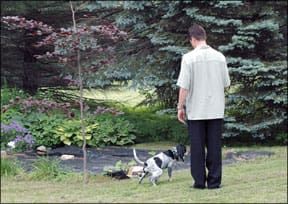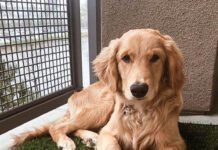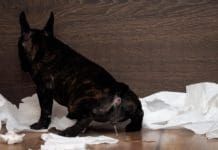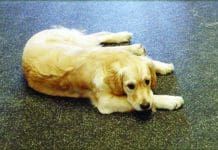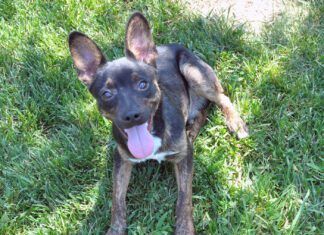There’s probably not a canine companion on earth who hasn’t had at least one accident in the house; it’s inevitable no matter how careful your management. Ideally the accidents are few, but what do you do when they do happen? It may depend on the circumstances, but here are five things that are appropriate in most cases when a previously well-housetrained dog goes potty in the house.
1) If you discover your dog in flagrante, cheerfully interrupt him with an “Oops! Outside!” and hustle him out to his legal potty spot. Do not punish him. If you do, you’ll just teach him to pick a more secluded spot next time where you’re less likely to catch him in the act.

2) Thoroughly clean any soiled spots with an enzymatic product designed to clean up animal waste. Use a black light to find untreated spots. Do not use ammonia-based products to clean! Urine contains ammonia and the ammonia in the cleaning products may actually inspire your dog to urinate on the spot where the ammonia-based product was used.
3) Take your dog out more frequently so he has more opportunity to do it right; every hour on the hour (during the day), at first, for young pups or older dogs who need remedial housetraining, then gradually lengthen the time between bathroom breaks.
Go out with him; don’t just send him out to the yard on his own. When he goes potty where he is supposed to, calmly praise him as he’s going (you don’t want to interrupt him!), then mark the desired behavior with a “Yes!” or other verbal marker when he’s finished, and give him a tasty treat.
Keep a potty journal, so you know when his last accident was and to keep track of his housetraining progress. When he’s gone a week with no accidents, increase the time between bathroom breaks by 30 minutes.
4) Give him periods of house freedom when you know he’s empty, but confine him to a crate or other small area (exercise pen) when you can’t supervise, or when you have to leave him alone for an extended period (or overnight). Be sure he doesn’t tank up on water just before bed. Don’t crate him longer than he can hold it; if you have to be gone for a long time, have a friend, family member, or pet-sitter take him out for a potty break.
5) Make sure there are no medical issues that might be interfering with his ability to “hold it.” If he has several lapses in housetraining, make an appointment for a thorough health examination with your vet. Diarrhea almost guarantees accidents, and things like urinary tract infections, and kidney and bladder stones will also cause housesoiling.
By the way, I don’t consider a dog reliably housetrained until he’s at least a year old. My own Bonnie was more than two years old before she could be trusted for long periods in the house.
One last thing: That old rolled up newspaper? You can use it to smack yourself in the head every time your dog has an accident, for allowing your management program to slip. If it’s not caused by a medical problem, an indoor potty incident is always a management lapse. Urine “marking” – a different behavior from housesoiling – is another story, and one for a future column.


